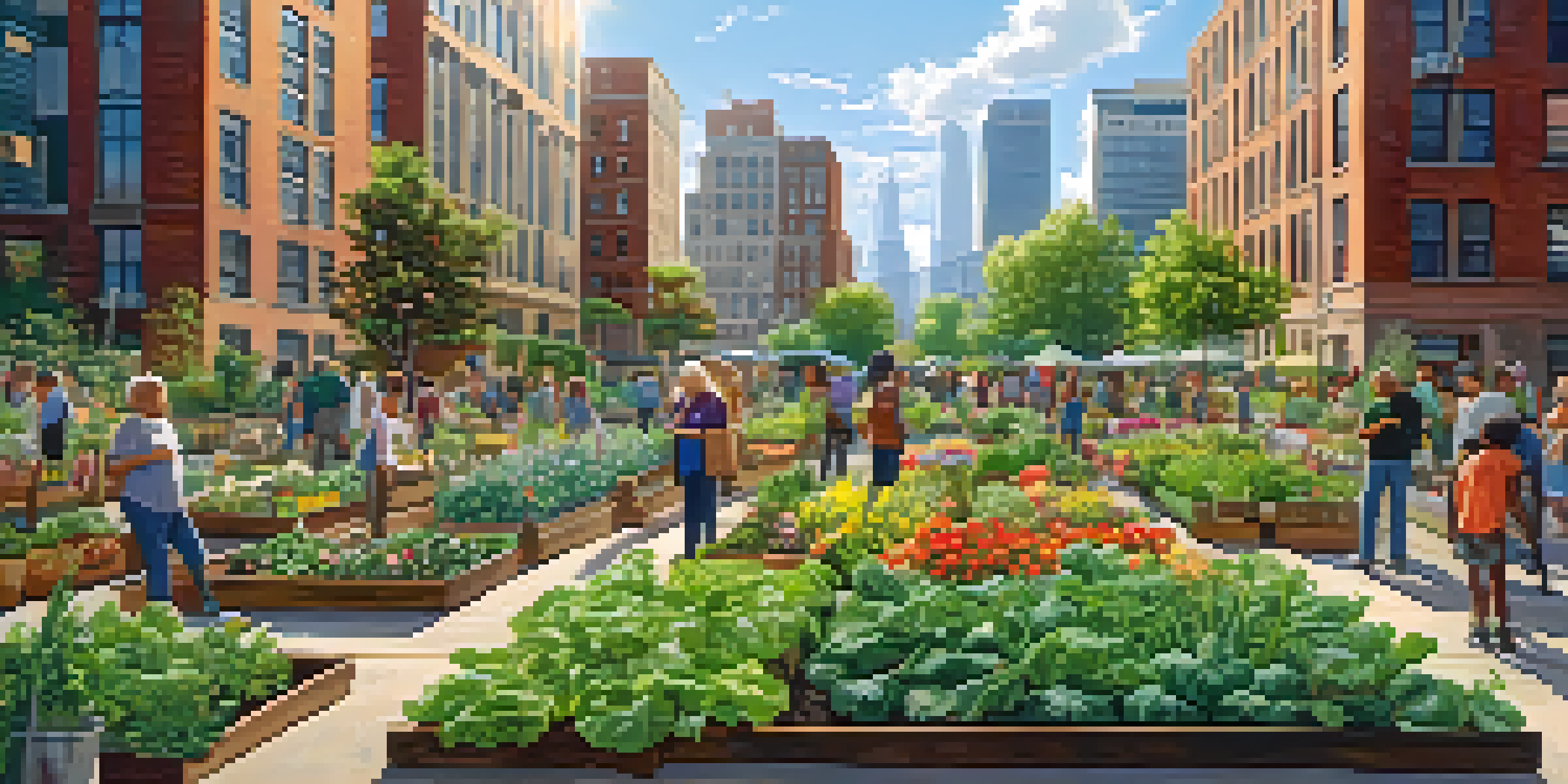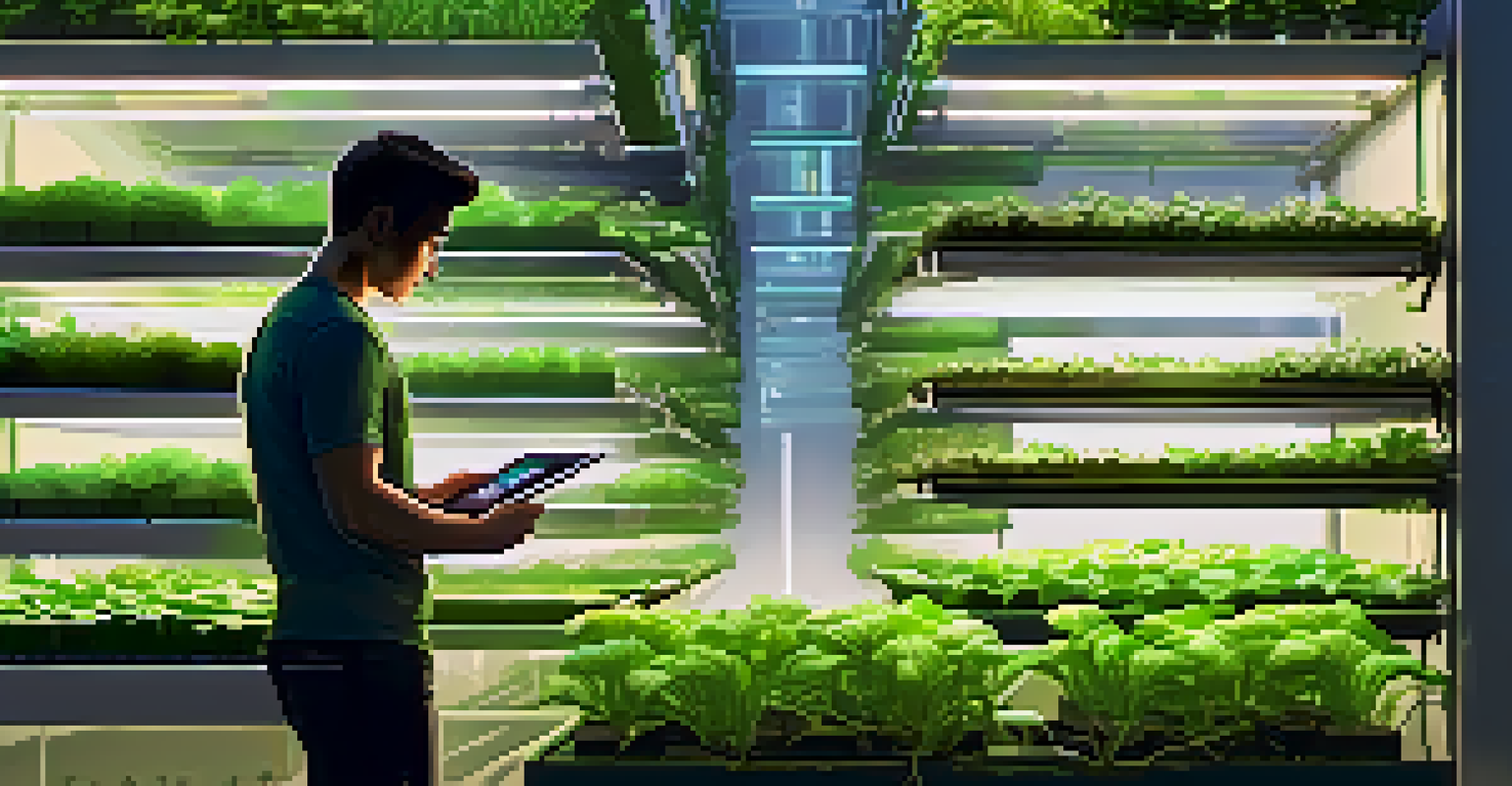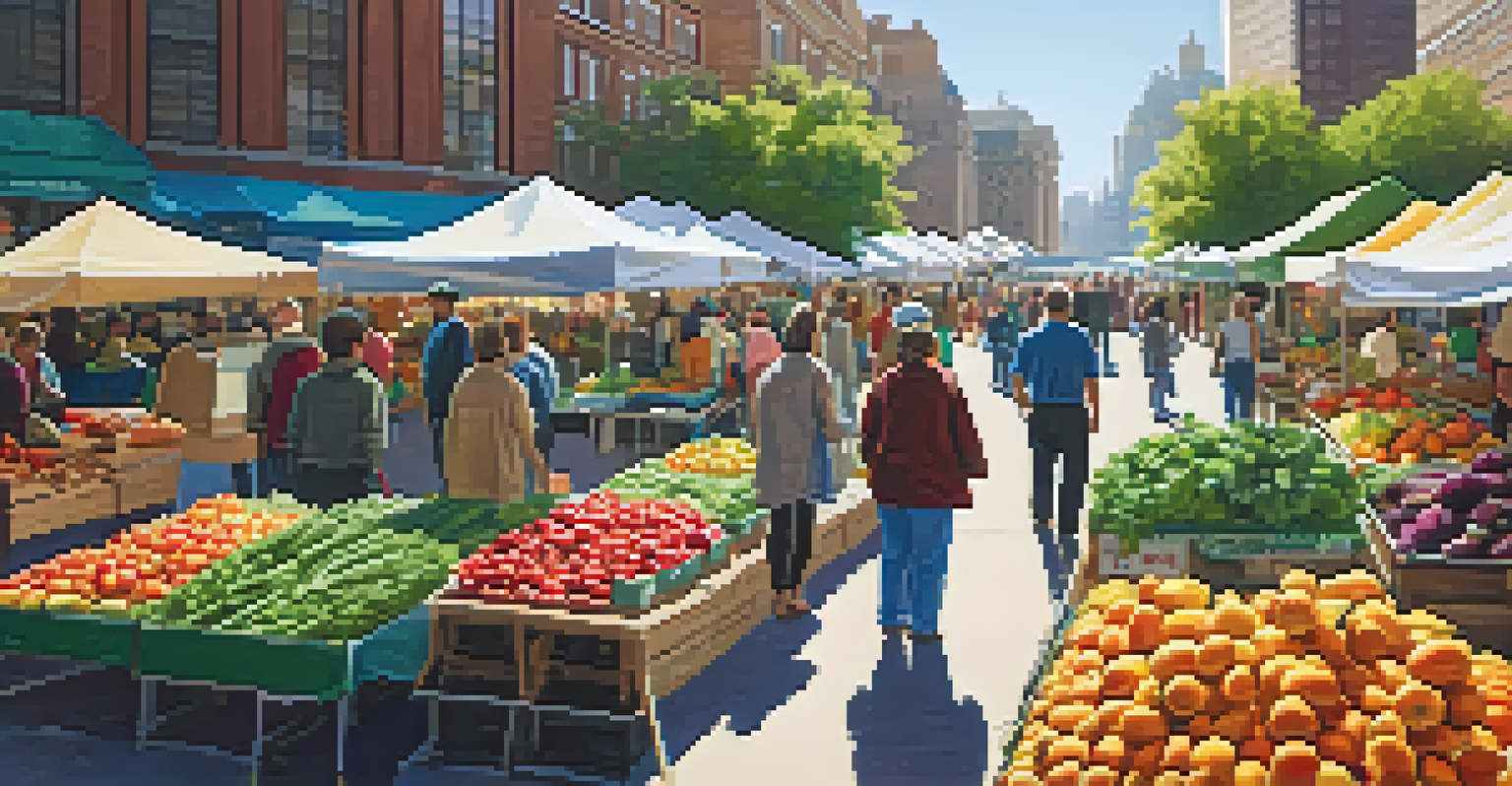Urban Agriculture: Transforming Phoenix's Food Systems

Understanding Urban Agriculture and Its Importance
Urban agriculture refers to the practice of cultivating, processing, and distributing food in or around urban areas. This approach to food production is crucial, especially in cities where space is limited and food deserts exist. By utilizing vacant lots, rooftops, and community gardens, urban agriculture offers a sustainable solution to food insecurity while also promoting community engagement.
Urban agriculture is not just about growing food; it's about growing community.
In Phoenix, where the desert climate poses unique challenges, urban agriculture is becoming increasingly vital. It not only provides fresh produce to residents but also helps mitigate the urban heat island effect by increasing green spaces. This dual benefit of food production and environmental improvement highlights why urban agriculture is essential for cities like Phoenix.
Moreover, urban agriculture fosters a sense of community and connection among residents. By coming together to grow food, people learn about nutrition, cooking, and sustainability. This shared experience strengthens social ties and encourages healthier lifestyles, making urban agriculture a key player in transforming food systems.
The Benefits of Urban Farming in Phoenix
Urban farming in Phoenix offers numerous benefits, from reducing food miles to enhancing food security. By growing food locally, communities can decrease their dependence on long supply chains that often lead to food spoilage and increased carbon footprints. This local approach not only ensures fresher produce but also supports local economies and job creation.

Another significant benefit of urban agriculture is its potential for education. Schools and community programs that incorporate gardening teach children and adults alike about the food system, nutrition, and environmental stewardship. These educational initiatives empower residents to make informed choices about their food, fostering a culture of health and sustainability.
Urban Agriculture Boosts Food Security
Urban agriculture in Phoenix enhances food access and reduces reliance on distant supply chains.
Additionally, urban farming contributes to biodiversity by introducing a variety of plants and pollinators into the urban landscape. This biodiversity is crucial for resilient ecosystems and helps combat pests and diseases naturally. In a city like Phoenix, where water conservation is vital, urban farms often employ innovative practices that maximize irrigation efficiency, further enhancing their sustainability.
Challenges Facing Urban Agriculture in Phoenix
While urban agriculture presents many advantages, it is not without its challenges. One significant hurdle is the scarcity of suitable land. In a rapidly growing city like Phoenix, zoning regulations and land use policies can limit access to spaces for farming. This often forces urban farmers to be creative in their use of available areas, such as utilizing vertical gardens or hydroponic systems.
In the midst of movement and chaos, keep stillness inside of you.
Water availability is another critical challenge for urban agriculture in the desert climate of Phoenix. With limited water resources, farmers must adopt efficient irrigation techniques and drought-resistant crops to ensure sustainability. This necessity can lead to increased operational costs and requires ongoing education and support for urban farmers.
Furthermore, urban agriculture initiatives may struggle with funding and resources. Many rely on grants, donations, or community support to thrive. Strengthening partnerships with local governments, businesses, and non-profits can help provide the necessary resources and advocacy to overcome these barriers and ensure the success of urban farming efforts.
Community Engagement and Urban Farming Initiatives
Community engagement is at the heart of successful urban farming initiatives. In Phoenix, various organizations work tirelessly to bring residents together, fostering a sense of ownership and pride in local food production. These initiatives often include workshops, volunteer days, and farm-to-table events that not only educate but also build relationships among community members.
One notable example is the use of community gardens, where neighbors collaborate to grow food together. These gardens serve as gathering spaces, where people share knowledge, skills, and resources. The sense of community that develops around these gardens can lead to increased social cohesion and a stronger support network.
Community Engagement Drives Success
Successful urban farming initiatives in Phoenix foster community connections and promote healthy lifestyles.
Additionally, urban farming initiatives often partner with local schools to incorporate gardening into educational curricula. This not only teaches students about food production but also emphasizes the importance of healthy eating and environmental stewardship. When children are involved in growing their own food, they are more likely to develop positive attitudes towards nutrition and sustainability.
Innovative Solutions in Urban Agriculture
Innovation plays a crucial role in the evolution of urban agriculture in Phoenix. Many urban farmers are adopting cutting-edge technologies, such as aquaponics and vertical farming, to maximize space and resources. These methods allow for efficient food production in limited areas, making urban farming viable even in densely populated neighborhoods.
Furthermore, the integration of smart farming technologies, like sensors and automated irrigation systems, is helping farmers optimize their operations. By monitoring conditions such as soil moisture and plant health, urban farmers can make data-driven decisions that enhance productivity while conserving vital resources.
These innovative solutions not only boost food production but also inspire a new generation of urban farmers. As technology continues to evolve, it opens up exciting possibilities for sustainable agriculture in urban settings. This spirit of innovation is essential for transforming Phoenix's food systems into something that can adapt and thrive in the face of future challenges.
Policy Support for Urban Agriculture Development
Effective policies are essential for fostering urban agriculture in Phoenix. Local governments can play a pivotal role by implementing supportive zoning laws, providing grants, and facilitating access to resources for urban farmers. By creating a regulatory environment that encourages food production within city limits, policymakers can help remove barriers that hinder urban agriculture's growth.
In addition, community advocacy is vital for raising awareness about the benefits of urban agriculture. Grassroots movements can pressure local officials to prioritize urban farming in city planning and development initiatives. When residents actively participate in shaping policies, it leads to more sustainable and equitable food systems.
Innovation Shapes Urban Farming Future
Adoption of innovative practices and technologies is essential for the sustainability and growth of urban agriculture in Phoenix.
Collaboration between various stakeholders, including government, non-profits, and businesses, is also crucial. By working together, these entities can develop comprehensive strategies that address the unique challenges of urban agriculture while promoting its benefits. Such partnerships can help ensure that urban farming thrives and contributes positively to Phoenix's food landscape.
Looking Ahead: The Future of Urban Agriculture in Phoenix
As the demand for locally grown food continues to rise, the future of urban agriculture in Phoenix looks promising. With ongoing community engagement, innovative practices, and supportive policies, urban farming can become a cornerstone of the city's food system. This shift not only enhances food security but also contributes to environmental sustainability and community well-being.
Moreover, as more residents embrace the idea of growing their own food, we can expect a cultural shift toward sustainability and healthy living. Urban agriculture has the potential to revitalize neighborhoods, create green spaces, and foster connections among diverse populations. The transformation of Phoenix's food systems is not just about producing food; it's about building resilient communities.

Ultimately, the success of urban agriculture in Phoenix will depend on collaboration and commitment from all stakeholders. By nurturing a culture of innovation, advocacy, and education, we can ensure that urban farming thrives for generations to come. Together, we can cultivate a vibrant and sustainable food future for the city.